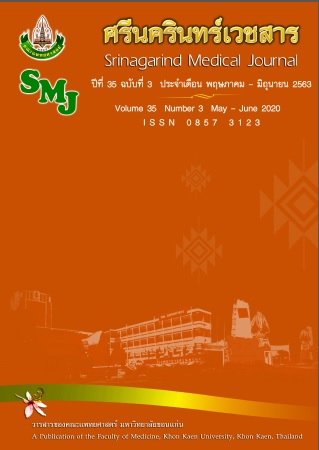Stress and Medication Adherence among Continuous Ambulatory Peritoneal Dialysis Patients
Keywords:
stress, medication adherence, continuous ambulatory peritoneal dialysis patients, ความเครียด, ความร่วมมือในการใช้ยา, ผู้ป่วยล้างไตทางช่องท้องอย่างต่อเนื่องAbstract
ความเครียด และความร่วมมือในการใช้ยาในผู้ป่วยล้างไตทางช่องท้องอย่างต่อเนื่อง
กานตพัจน์ พ่วงหลาย1, ชานนท์ จารุพักตรานนท์1, สิริภา ช้างศิริกุลชัย2, จิรายุทธ จันทร์มา2, วรรณคล เชื้อมงคล1*
1 สาขาวิชาเภสัชกรรมคลินิก คณะเภสัชศาสตร์ มหาวิทยาลัยศรีนครินทรวิโรฒ อ.องครักษ์ จ.นครนายก 26120
2 สาขาวิชาโรคไต ภาควิชาอายุรศาสตร์ คณะแพทยศาสตร์ มหาวิทยาลัยศรีนครินทรวิโรฒ อ.องครักษ์ จ.นครนายก 26120
หลักการและวัตถุประสงค์: การศึกษานี้มีวัตถุประสงค์เพื่อประเมินความชุกของความเครียด และความร่วมมือในการใช้ยา และวิเคราะห์ความสัมพันธ์ระหว่างความเครียดกับความร่วมมือในการใช้ยา ในผู้ป่วยล้างไตทางช่องท้องอย่างต่อเนื่อง ที่มารับบริการที่ศูนย์การแพทย์สมเด็จพระเทพรัตนราชสุดาฯ สยามบรมราชกุมารี
วิธีการศึกษา: เป็นการศึกษาเชิงพรรณนาแบบภาคตัดขวาง ในผู้ป่วยล้างไตทางช่องท้องอย่างต่อเนื่อง จำนวน 115 ราย เก็บข้อมูลโดยใช้แบบประเมินและวิเคราะห์ความเครียดด้วยตนเองของกรมสุขภาพจิต กระทรวงสาธารณสุข และแบบประเมินพฤติกรรมการใช้ยาในคนไทย
ผลการศึกษา: พบความชุกของความเครียดร้อยละ 6.96 โดยจัดเป็นความเครียดระดับสูงกว่าปกติเล็กน้อยร้อยละ 5.22 และความเครียดระดับสูงกว่าปกติมากร้อยละ 1.74 ผู้ป่วยล้างไตทางช่องท้องอย่างต่อเนื่องที่เข้าร่วมการวิจัยมีความร่วมมือในการใช้ยาระดับสูง ระดับปานกลาง และระดับต่ำ ร้อยละ 41.74, 41.74 และ 16.52 ตามลำดับ โดยไม่พบความสัมพันธ์ระหว่างความเครียดกับความร่วมมือในการใช้ยาของผู้ป่วยล้างไตทางช่องท้องอย่างต่อเนื่องอย่างมีนัยสำคัญทางสถิติ (p=1.000)
สรุป: ผู้ป่วยล้างไตทางช่องท้องอย่างต่อเนื่องที่มารับบริการที่ศูนย์การแพทย์สมเด็จพระเทพรัตนราชสุดาฯ สยามบรมราชกุมารี มีความเครียดน้อย และไม่พบความสัมพันธ์ระหว่างความเครียดกับความร่วมมือในการใช้ยา
Background and Objectives: This study aimed to investigate the prevalence of stress and medication adherence and to analyze the relationship between stress and medication adherence among continuous ambulatory peritoneal dialysis (CAPD) patients at HRH Princess Maha Chakri Sirindhorn medical center.
Methods: This cross-sectional descriptive study was performed in 115 patients with CAPD. Research questionnaire included stress test of Department of Mental Health, Ministry of Public Health and Medication taking behavior tool in Thai patient (MTB-Thai).
Results: The prevalence of stress was 6.96% (slightly high-level of stress 5.22%; more high-level of stress 1.74%). CAPD patients with high, moderate and low level of medication adherence were 41.74%, 41.74% and 16.52%, respectively. However, no relationship between stress and medication adherence was found (p=1.000).
Conclusion: CAPD patients at HRH Princess Maha Chakri Sirindhorn medical center had a low rate of stress and that was not associated with medication adherence.
References
Department of Mental Health, Ministry of Public Health. Manual for stress reduction (revised version). Bangkok: Design Conduction; 2012.
Wongchaisuriya T. Chronic Kidney Disease: CKD [Internet]. 2017 [cited 13 Dec 2018]. Available from: http://www.tmwa.or.th/new/lib/file/20170111202558.pdf.
The Nephrology Society of Thailand. Clinical practice recommendation for the evaluation and management of chronic kidney disease in adults 2015. 2015 [cited 13 Dec 2018]. Available from: http://www.nephrothai.org.
Thokaew S. Depression in hemodialysis patients in Nakhon Pathom province. [Master of Science in Mental Health]. Bangkok: Chulalongkorn University; 2003.
Tafet GE, Nemenoff CB. The links between stress and depression: psychoneuroendocrinological, genetic, and environmental interactions. J Neuropsychiatry Clin Neurosci 2016; 28: 77-88.
Cukor D, Rosenthal DS, Jindal RM, Brown CD, Kimmel PL. Depression is an important contributor to low medication adherence in hemodialyzed patients and transplant recipients. Kidney Int 2009:75:1223-9.
Yamane T. Statistic: an introduction analysis. 3rd edition. New York: Harper and Row publication; 1973.
Sakthong P, Sonsa-Ardjit N, Sukarnjanaset P, Munpan W, Suksanga P. Development and psychometric testing of the medication taking behavior tool in Thai patients. Int J Clin Pharm 2016; 38:438–45.
Sinnakirouchenan R, Holley JL. Peritoneal dialysis versus hemodialysis: risks, benefits, and access issues. Adv Chronic Kidney Dis 2011; 18: 428-32.
Goh ZS, Griva K. Anxiety and depression in patients with end-stage renal. Int J Nephrol Renovasc Dis 2018; 11: 93–102.
Kutner NG, Zhang R, McClellan WM, Cole SA. Psychosocial predictors of non-compliance in haemodialysis and peritoneal dialysis patients. Nephrol Dial Transplant 2002; 17: 93-9.


